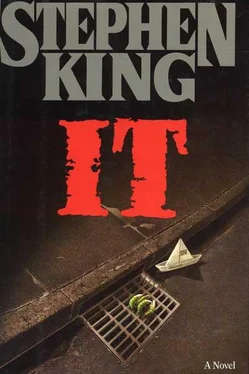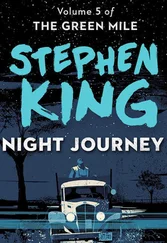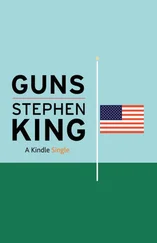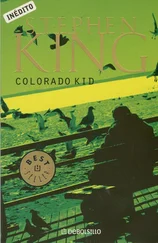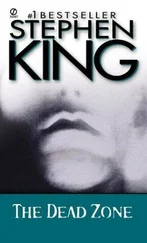Stephen King - It
Здесь есть возможность читать онлайн «Stephen King - It» весь текст электронной книги совершенно бесплатно (целиком полную версию без сокращений). В некоторых случаях можно слушать аудио, скачать через торрент в формате fb2 и присутствует краткое содержание. Год выпуска: 1986, Жанр: Ужасы и Мистика, на английском языке. Описание произведения, (предисловие) а так же отзывы посетителей доступны на портале библиотеки ЛибКат.
- Название:It
- Автор:
- Жанр:
- Год:1986
- ISBN:нет данных
- Рейтинг книги:4.33 / 5. Голосов: 3
-
Избранное:Добавить в избранное
- Отзывы:
-
Ваша оценка:
- 80
- 1
- 2
- 3
- 4
- 5
It: краткое содержание, описание и аннотация
Предлагаем к чтению аннотацию, описание, краткое содержание или предисловие (зависит от того, что написал сам автор книги «It»). Если вы не нашли необходимую информацию о книге — напишите в комментариях, мы постараемся отыскать её.
It — читать онлайн бесплатно полную книгу (весь текст) целиком
Ниже представлен текст книги, разбитый по страницам. Система сохранения места последней прочитанной страницы, позволяет с удобством читать онлайн бесплатно книгу «It», без необходимости каждый раз заново искать на чём Вы остановились. Поставьте закладку, и сможете в любой момент перейти на страницу, на которой закончили чтение.
Интервал:
Закладка:
“You don’t have to talk out loud, Henry,” Vie said. “I can hear you if you just think. And they can’t hear me at all.”
What do you want, Vie? Henry asked.
There was no reply for a long time. Henry thought that maybe Vie had gone away. Outside the door the volume of Koontz’s TV went up again. Then there was a scratching noise from under the bed; the springs squealed slightly as a dark shadow pulled itself out from under. Vie looked up at him and grinned. Henry grinned back uneasily. Ole Vie was looking a little bit like the Frankenstein-monster himself these days. A scar like a hangrope tattoo circled his neck. Henry thought maybe that was where his head had been sewed back on. His eyes were a weird gray-green color, and the corneas seemed to float on a watery viscous substance.
Vie was still twelve.
“I want the same thing you want,” Vie said. “I want to pay em back.”
Pay em back, Henry Bowers said dreamily.
“But you’ll have to get out of here to do it,” Vie said. “You’ll have to go back to Derry. I need you, Henry. We all need you.”
They can’t hurt You, Henry said, understanding he was talking to more than Vie.
They can’t hurt Me if they only half-believe,” Vie said. “But there have been some distressing signs, Henry. We didn’t think they could beat us back then, either. But the fatboy got away from you in the Barrens. The fatboy and the smartmouth and the quiff got away from us that day after the movies. And the rockfight, when they saved the nigger-”
Don’t talk about that! Henry shouted at Vie, and for a moment all of the peremptory hardness that had made him their leader was in his voice. Then he cringed, thinking Vie would hurt him-surely Vie could do whatever he wanted, since he was a ghost-but Vie only grinned.
“I can take care of them if they only half-believe,” he said, “but you’re alive, Henry. You can get them no matter if they believe, half-believe, or don’t believe at all. You can get them one by one or all at once. You can pay em back.”
Pay em back, Henry repeated. Then he looked at Vie doubtfully again. But I can’t get out of here, Vie. There’s wire on the windows and Koontz is on the door tonight. Koontz is the worst. Maybe tomorrow night…
’don’t worry about Koontz,” Vie said, standing up. Henry saw he was still wearing the jeans he had been wearing that day, and that they were still splattered with drying sewer-muck. “I’ll take care of Koontz.” Vie held out his hand.
After a moment Henry took it. He and Vie walked toward the Blue Ward door and the sound of the TV. They were almost there when Jimmy Donlin, who had eaten his mother’s brains, woke up. His eyes widened as he saw Henry’s late-night visitor. It was his mother. Her slip was showing just a quarter-inch or so, as it always had. The top of her head was gone. Her eyes, horribly red, rolled toward him, and when she grinned, Jimmy saw the lipstick smears on her yellow, horsy teeth as he always had. Jimmy began to shriek. “No, Ma! No, Ma! No Ma!”
The TV went off at once, and even before the others could begin to stir, Koontz was jerking the door open and saying, “Okay, asshole, get ready to catch your head on the rebound. I’ve had it.”
“No, Ma! No, Ma! Please, Ma! No, Ma-”
Koontz came rushing in. First he saw Bowers, standing tall and paunchy and nearly ridiculous in his johnny, his loose flesh doughy in the light spilling in from the corridor. Then he looked left and screamed out two lungfuls of silent spun glass. Standing by Bowers was a thing in a clown suit. It stood perhaps eight feet tall. Its suit was silvery. Orange pompoms ran down the front. There were oversized funny shoes on its feet. But its head was not that of a man or a clown; it was the head of a Doberman pinscher, the only animal on God’s green earth of which John Koontz was frightened. Its eyes were red. Its silky muzzle wrinkled back to show huge white teeth.
A cylinder of quarters fell from Koontz’s nerveless fingers and rolled across the floor and into the corner. Late the following day Benny Beaulieu, who slept through the whole thing, would find them and hide them in his footlocker. The quarters bought him cigarettes-tailor-mades-for a month.
Koontz hitched in breath to scream again as the clown lurched toward him.
“It’s time for the circus!” the clown screamed in a growling voice, and its white-gloved hands fell on Koontz’s shoulders.
Except that the hands inside those gloves felt like paws.
3
For the third time that day-that long, long day-Kay McCall went to the telephone.
She got further this time than she had on the first two occasions; this time she waited until the phone had been picked up on the other end and a hearty Irish cop’s voice said “sixth Street Station, Sergeant O’Bannon, how may I help you?” before hanging up.
Oh, you’re doing fine. Jesus, yes. By the eighth or ninth time you’ll have mustered up guts enough to give him your name.
She went into the kitchen and fixed herself a weak Scotch-and-soda, although she knew it probably wasn’t a good idea on top of the Darvon. She recalled a snatch of folk-song from the college coffee-houses of her youth-Got a headful of whiskey and a bellyful of gin / Doctor say it kill me but he don’t say when-and laughed jaggedly. There was a mirror running along the top of the bar. She saw her reflection in it and stopped laughing abruptly.
Who is that woman?
One eye swollen nearly shut.
Who is that battered woman?
Nose the color of a drunken knight’s after thirty or so years of tilting at ginmills, and puffed to a grotesque size.
Who is that battered woman who looks like the ones who drag themselves to a women’s shelter after they finally get frightened enough or brave enough or just plain mad enough to leave the man who is hurting them, who has systematically hurt them week in and week out, month in and month out, year in and year out?
Laddered scratch up one cheek.
Who is she, Kay-Bird?
One arm in a sling.
Who? Is it you? Can it be you?
“Here she is… Miss America,” she sang, wanting her voice to come out tough and cynical. It started out that way but warbled on the seventh syllable and cracked on the eighth. It was not a tough voice. It was a scared voice. She knew it; she had been scared before and had always gotten over it. She thought she would be a long time getting over this.
The doctor who had treated her in one of the little cubicles just off Emergency Admitting at Sisters of Mercy half a mile down the road had been young and not bad-looking. Under different circumstances she might have idly (or not so idly) considered trying to get him home and take him on a sexual tour of the world. But she hadn’t felt in the least bit horny. Pain wasn’t conducive to horniness. Neither was fear.
His name was Geffin, and she didn’t care for the fixed way he was looking at her. He took a small white paper cup to the room’s sink, half-filled it with water, produced a pack of cigarettes from the drawer of his desk, and offered them to her.
She took one and he lit it for her. He had to chase the tip for a second or two with the match because her hand was shaking. He tossed the match in a paper cup. Fssss.
“A wonderful habit,” he said. “Right?’
’Oral fixation,” Kay replied.
He nodded and then there was silence. He kept looking at her. She got the feeling he was expecting her to cry, and it made her mad because she felt she might just do that. She hated to be emotionally preguessed, and most of all by a man.
“Boyfriend?” he asked at last.
“I’d rather not talk about it.”
“Uh-huh.” He smoked and looked at her.
“Didn’t your mother ever tell you it was impolite to stare?”
Читать дальшеИнтервал:
Закладка:
Похожие книги на «It»
Представляем Вашему вниманию похожие книги на «It» списком для выбора. Мы отобрали схожую по названию и смыслу литературу в надежде предоставить читателям больше вариантов отыскать новые, интересные, ещё непрочитанные произведения.
Обсуждение, отзывы о книге «It» и просто собственные мнения читателей. Оставьте ваши комментарии, напишите, что Вы думаете о произведении, его смысле или главных героях. Укажите что конкретно понравилось, а что нет, и почему Вы так считаете.
